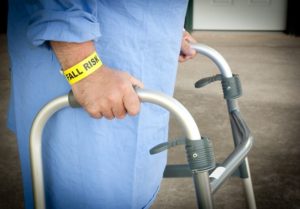Inpatient Falls at Hospitals: Malpractice vs. Negligence

For the most part, a large percentage of hospital patients at any given time are not in great physical shape. It’s common for patients to experience issues with balance and muscle weakness as side effects from a separate ailment, which makes them much more susceptible to falls. Sometimes, these cannot be avoided even with the appropriate aid of hospital staff; however, they can also be the result of medical malpractice or ordinary negligence.
Before we discuss these topics in detail, it’s worth mentioning that in order to know for sure whether or not your inpatient fall is considered an actionable offense, it’s best to consult with experienced medical malpractice and premises liability attorneys. Van Law Firm is dedicated to holding negligent parties accountable and recovering damages for those who need it most. After all, hospitals are meant to improve your health, not worsen it–call our office nearest you now to get started.
Cases Involving Medical Malpractice
Although inpatient falls are just like all other accident cases in that each is unique in its parameters and circumstances, most will be considered either ordinary negligence or full-on medical malpractice.
For a free legal consultation, call (725) 900-9000
As you can probably imagine, medical malpractice is a serious offense that could potentially cause a doctor or hospital employee to lose their job and/or their license to practice. As such, the bar that claimants must reach is no small task, as the following factors will all be weighed and considered:
- The level of care that was owed to the patient with regards to their condition
- Whether or not there was a breach in this duty that subsequently caused a fall
- The damages sustained by the patient as a result of this breach and fall
The Duty of Care Owed to Hospital Patients
A duty of care is essentially what it sounds like–it is a responsibility for doctors and hospital staff to act with care and protect patients as best as possible from hazards. This is a fluid concept, meaning that it changes based on the patient’s condition as well as the individual in charge. For example, a doctor’s duty of care for a patient who recently had a serious heart attack is higher than a nursing assistant’s would be for a patient getting stitches on their finger. The higher the duty of care, the easier it is to breach, legally speaking.
A Breach in the Duty of Care
Click to contact our personal injury lawyers today
In order to determine whether or not there was a breach in the patient’s duty of care, the doctor or employee’s actions must be compared to existing regulations. If there are no set standards for how the individual must act, other healthcare professionals, are often asked to compare the actions of the individual in question with how they would have acted themselves. If there is a large discrepancy between the majority and the defendant, the court may decide that there was in fact a breach of care.
Complete a Free Case Evaluation form now
This also brings up a key point with regards to all medical cases: given the fact that it is an extremely complex field that requires years of education and experience to understand, expert testimony is almost always needed to definitively determine what happened and whether or not there was a breach of care. These experts have handled similar situations and often do a good job explaining what happened, as well as what should have happened. As a claimant, you want nothing more than for one of these experts to rule in your favor, as their influence in these cases is usually substantial.
Cases Involving Ordinary Negligence
Some cases can also be considered ordinary negligence rather than medical malpractice. These cases arise whenever a patient’s fall is not directly caused by malpractice, but instead by unsafe or hazardous conditions. Most notably, this includes slippery surfaces, tripping hazards, and the like. These instances are generally much more cut-and-dry than malpractice suits, as there is typically no need to examine codes of conduct or bring in expert witnesses for general negligence claims. Patients simply need to prove that there was a hazardous condition on the property that should have been remedied but was not, and that it caused their fall.
Comparing Negligence and Malpractice
Just to reiterate, the main difference between standard negligence and medical malpractice cases is that one is directly related to the patient’s health and treatment while the other is not. Malpractice claims have to do with a specific action or set of actions that breached the patient’s duty of care, whereas standard negligence usually pertains to how the facility was maintained and is not concerned with the patient’s health at the time of the fall.
It’s important to understand, however, that both are unacceptable and claimants for each should certainly come forward to recover the compensation they deserve.
Protect Your Rights as a Patient
If you fell while receiving treatment in a hospital and believe that medical malpractice or negligence may have played a factor, call Van Law Firm as soon as possible in order to protect your rights. We’ve helped countless hospital patients recover compensation for injuries sustained from both negligence and malpractice, and we’re always pursuing new cases in order to help patients who may not be able to help themselves effectively. Call our office nearest you for a free consultation and case review.
No obligation consultations are always free.
Let Us Help You! Call Now: (725) 900-9000


